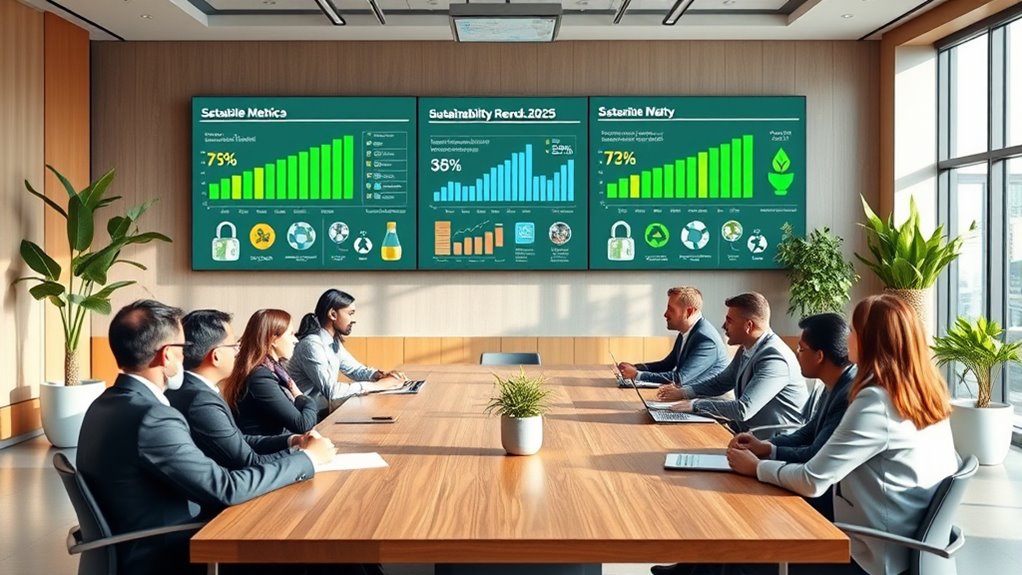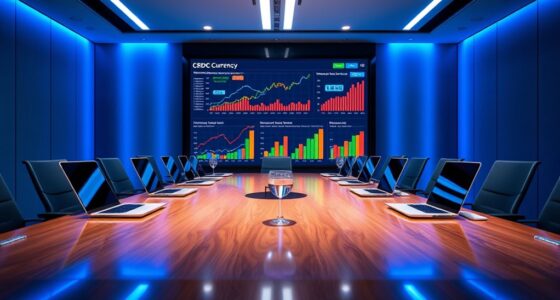By 2025, sustainability reporting will become more transparent and standardized, emphasizing detailed carbon disclosures and stakeholder engagement. You’ll need to prioritize open communication about greenhouse gas emissions and energy use, showing your company’s commitment to environmental responsibility. Stakeholder collaboration will be essential in setting and achieving targets, making efforts more inclusive and credible. Staying ahead means embracing ongoing dialogues and clear reporting practices—if you continue, you’ll discover strategies to meet these evolving expectations effectively.
Key Takeaways
- Expect increased standardization and detail in carbon disclosures for better cross-industry comparability.
- Stakeholder engagement will evolve into ongoing partnerships rather than one-time interactions.
- Transparency around financial impacts and reporting deadlines will become a central focus.
- Companies will integrate stakeholder input more deeply into sustainability targets and initiatives.
- Responsible practices by 2025 will heavily depend on transparent carbon data and active stakeholder collaboration.

Have you ever wondered how companies demonstrate their commitment to environmental and social responsibility? One of the most powerful ways they do this is through transparent sustainability reporting. As organizations aim to build trust and meet increasing stakeholder expectations, they focus on clear disclosure of their environmental impacts. Carbon disclosure, in particular, has become a key component. It involves openly sharing data on greenhouse gas emissions, energy consumption, and efforts to reduce their carbon footprint. This transparency not only showcases accountability but also helps companies identify areas for improvement. When you see detailed carbon disclosure, it signals that a company is serious about addressing climate change and is committed to measurable progress. It shifts the focus from vague promises to concrete actions, making sustainability a core part of their business strategy.
Alongside carbon disclosure, stakeholder engagement has gained prominence as a crucial element of sustainability reporting. You, as a stakeholder—whether you’re an investor, customer, employee, or community member—want to know that the company listens and responds to your concerns. Effective stakeholder engagement involves actively seeking feedback, involving diverse voices, and integrating their insights into decision-making processes. Companies that prioritize this engagement demonstrate a genuine commitment to social responsibility, showing they value transparency and inclusivity. When organizations communicate their sustainability goals and progress, they foster trust and foster stronger relationships with their stakeholders. This two-way dialogue can lead to better strategies, as companies learn from those affected by their operations and adapt accordingly.
Effective stakeholder engagement fosters trust, improves strategies, and demonstrates genuine social responsibility through transparent communication and inclusivity.
Furthermore, stakeholder engagement isn’t just about communication—it’s about collaboration. Companies are increasingly involving stakeholders in setting targets and developing initiatives, making sustainability efforts more inclusive and effective. This approach aligns with the broader trend of integrating stakeholder input into sustainability reports, which enhances credibility and accountability. As regulations tighten and expectations rise, organizations that proactively disclose their carbon data and engage stakeholders effectively will stand out. They’ll not only meet compliance requirements but also build a reputation for transparency and responsibility. Additionally, implementing a clear timeline for disclosure and engagement can help organizations stay on track and demonstrate ongoing commitment, especially when aligned with financial aspects such as reporting deadlines and asset transparency.
In the future, expect sustainability reporting to become even more integral to corporate identity. Carbon disclosure will likely be more detailed and standardized, making comparisons across industries easier. Stakeholder engagement will evolve into ongoing partnerships rather than one-time efforts, ensuring companies stay aligned with societal values. If you’re part of a company or investment decision-making process, understanding these trends will help you recognize organizations committed to genuine sustainability. In principle, transparent carbon disclosure combined with meaningful stakeholder engagement will be the cornerstone of responsible business practices by 2025, shaping how organizations demonstrate their commitment to a sustainable future.
Frequently Asked Questions
How Will Sustainability Reporting Influence Investor Decisions by 2025?
By 2025, sustainability reporting will substantially influence your investment choices. You’ll rely on companies’ transparency metrics and stakeholder engagement efforts to assess risks and growth potential. Clear, thorough reports will help you identify organizations committed to sustainable practices, ultimately guiding you toward responsible investments. As companies improve their reporting, you’ll have better insights to make informed decisions aligned with your values and financial goals.
What Technological Tools Will Enhance Sustainability Data Accuracy?
Think of AI integration and Blockchain verification as your company’s GPS and security camera. They guarantee your sustainability data is accurate and tamper-proof. By adopting these tools, you can identify discrepancies early and build trust with stakeholders. As data complexity grows, these technologies will be essential for precise, transparent reporting, much like a GPS guiding you through unfamiliar terrain with confidence.
How Will Regulatory Changes Impact Corporate Sustainability Disclosures?
Regulatory changes will considerably impact your sustainability disclosures by tightening requirements for compliance and demanding greater disclosure transparency. You’ll need to stay ahead of evolving regulations to avoid penalties and maintain stakeholder trust. These updates will push you to enhance your reporting practices, ensuring your disclosures meet new standards for accuracy and transparency. Staying proactive and integrating regulatory compliance into your sustainability strategy will help you navigate these shifts effectively.
What Skills Will Professionals Need for Future Sustainability Reporting Roles?
As the saying goes, “knowledge is power,” and in future sustainability reporting, you’ll need strong data analysis skills to interpret complex environmental data. You’ll also master stakeholder engagement, ensuring transparent communication with diverse groups. Adaptability is essential, allowing you to navigate evolving standards and technology. These skills will empower you to craft credible reports that meet regulatory demands and foster trust, making you a crucial player in driving corporate sustainability forward.
How Can Small Businesses Effectively Implement Sustainability Reporting Standards?
You can effectively implement sustainability reporting standards in your small business by engaging SMEs early in the process to gather accurate data and insights. Focus on clear resource allocation, dedicating time and personnel to key reporting tasks. Simplify standards where possible, using available tools and frameworks to streamline your efforts. Regularly review and update your practices, ensuring your sustainability efforts are transparent, credible, and aligned with evolving standards.
Conclusion
As you navigate the evolving landscape of sustainability reporting, remember it’s your compass guiding responsible business practices. By 2025, embracing transparency isn’t just a trend—it’s your anchor in building trust and resilience. Think of sustainability reporting as your company’s heartbeat, steady and essential. Staying ahead means you’re not just following the tide but steering it, ensuring your organization’s future is as bright and sustainable as the goals you set today.










